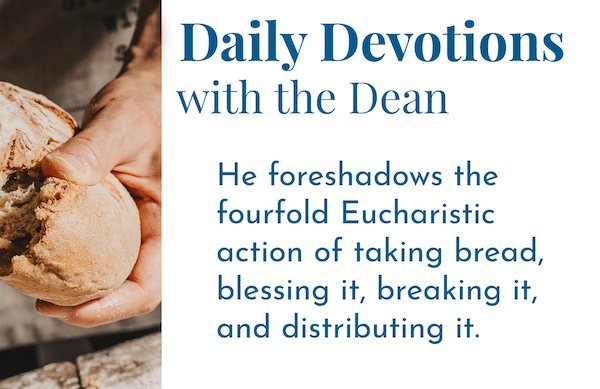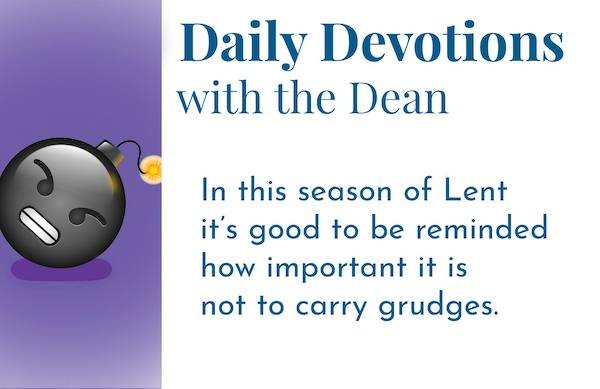Wednesday • 3/20/2024 •
Wednesday of 5 Lent, Year Two
This morning’s Scriptures are: Psalm 119:145-176; Exodus 7:8-24; 2 Corinthians 2:14–3:6; Mark 10:1–16
This morning’s Canticles are: following the OT reading, Canticle 11 (“The Third Song of Isaiah,” Isaiah 60:1-3,11a,14c,18-19, BCP, p. 87); following the Epistle reading, Canticle 16 (“The Song of Zechariah,” Luke 1:68-79, BCP, p. 92)
Welcome to Daily Office Devotions, where every Monday through Friday we ask how God might direct our lives from that day’s Scripture readings, as given in the Book of Common Prayer. I’m Reggie Kidd, and I’m grateful to be with you this Wednesday of the fifth week of Lent, as we prepare for Holy Week. We are in Year 2 of the Daily Office Lectionary.
The heart is everything
Exodus: hard heart disease. “Then the Lord said to Moses, “Pharaoh’s heart is hardened; he refuses to let the people go’” (Exodus 7:14). Over the years, Jewish, Christian, and secularist interpreters have wrestled mightily with the hardening of Pharaoh’s heart. Ten times the book of Exodus says that Yahweh hardens Pharaoh’s heart. Nine times the book of Exodus says that Pharaoh hardens his own heart or simply that his heart is hardened. I confess the dynamic remains a mystery to me.
But because the locus of the problem for Pharaoh lies in the heart—the center of our being that is oriented either toward or away from God—the plagues do challenge all of us to do a check up on our own hearts.
If our heart is inclined towards him, bad things no less than good will cause us to bless his name. If our heart is tilted away from him, good things no less than bad will contribute to our disdain for him. A financial windfall can be as detrimental to our spiritual heart condition as a huge loss. A bad medical diagnosis has as much capacity to lead us to a deeper love for God as does a good one. Everything that happens to us either pushes us further away from God or pulls us further in.
2 Corinthians: a heart that takes ink. “You yourselves are our letter, written on our hearts, to be known and read by all; and you show that you are a letter of Christ, prepared by us, written not with ink but with the Spirit of the living God, not on tablets of stone but on tablets of human hearts” — 2 Corinthians 3:2–3.
I take pleasure in writing notes by hand. Given a wide-nib fountain pen or a wide rollerball pen and luxurious card stock, I delight to see words take shape. After a few lines, I find myself writing with a flourish. It’s irritating, by contrast, to have a restaurant server expect you to sign a bill with a dried-up fine-point ballpoint pen on thin glossy paper that won’t even take ink. I try to redeem every instance in which that happens by quietly praying: “Lord, let this not be me. May my heart be a luxurious place for you to write — may my life unfold as a living epistle under your hand.”
May this Lenten season, in which we examine ourselves, repent, pray, fast, deny ourselves, and read and mediate on God’s holy Word, be a time in which we freshly discover the Lord’s own joy in finding our hearts luxuriously receptive to the ink of his hand.
Mark: a heart given to relationship. The surest gauge for whether our heart is turned toward God is whether it is turned toward people. If we love God, we’re going to love those who bear his image. Jesus says two of the biggest tests for that are how we’re doing with the image-bearer to whom we are married (if, indeed, we are married — and if not, there are principles here that apply to our relationship with God and with others) and how we’re doing with the “little ones” in our life (and who doesn’t relate to children in at least some way?!).
If, in our marriage, we are keeping the backdoor open just in case, if our career is more important than our home, if we are keeping a little something-something on the side or in a fantasy-world, then there’s a heart-problem. If, on the other hand, we’re “all in” emotionally, mentally, spiritually, our heart is where it needs to be.
If our attitude toward the kids in our life is condescending, and if our treatment of them is unkind and indifferent, then there’s a heart-problem. If, on the other hand, the amazing “miniature human beings” in our lives know they are not only safe with us, but that we value, respect, and cherish them, our heart is where it needs to be.
Lord, forgive us when our hearts grow hard against you. Grant us a “heart of flesh” instead of a “heart of stone.” May we see your providing hand in every part of our lives. May we receive with grace the writing of your story into ours. May we find joy in serving you in those you place close in our lives.
Be blessed this day,
Reggie Kidd+













